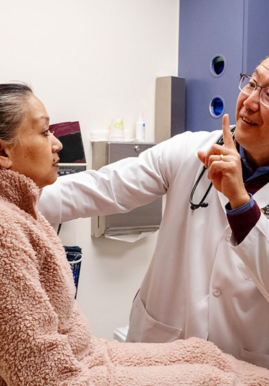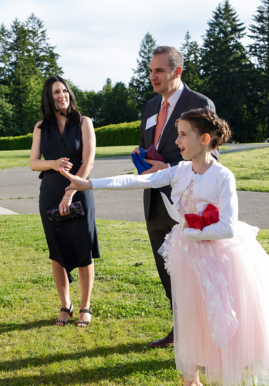Depression, anxiety and other mental health concerns take on added dimensions when a woman is expecting a baby or has just had a child. Questions arise about how best to treat these conditions during this stage of a woman’s life. Inconsistent studies and an overwhelming amount of information can be alarming for both patients and providers. With the addition of two new programs, UW Medicine has strengthened its efforts to help women navigate difficult choices surrounding pregnancy and mental health.
Once a week, UW Medicine psychiatrists see patients at the Perinatal Psychiatry Clinic at the Outpatient Psychiatry Clinic at University of Washington Medical Center-Roosevelt. It is run by women’s mental health specialists Deborah Cowley and Amritha Bhat, both on the faculty of the UW Department of Psychiatry and Behavioral Sciences.
The clinic offers consultation and treatment for any woman with a mental health condition who is pregnant (or considering becoming pregnant) or who has recently given birth.
“We see women with a wide variety of mental health questions who are often very worried about the potential effects of medication on their baby,” said Cowley. “They are looking for guidance in how best to weigh the effects of medication versus the effects of a psychiatric illness.”
For example, untreated depression in new moms and moms-to-be can lead to serious consequences, such as poor functioning, hospitalization or suicide attempts. It also increases the odds of preterm birth and can disrupt attachment and bonding with the infant. In addition, as they grow up, the offspring of depressed mothers have higher rates of depression and other mental disorders.
During pregnancy, treatment for depression, bipolar disorder, schizophrenia and other mental health conditions can be a conundrum. It often involves using psychotropic medications that can have unintended consequences for mother and child. Mothers breastfeeding their babies also have medication concerns.
“We try to find the best solution for both the mom and the baby,” said Bhat. “Sometimes that means using psychotherapy instead of medications. Sometimes it means picking one psychotropic medication over another. We present the best available evidence and put it in perspective to help the mother and father make informed decisions.” The UW School of Pharmacy is among those conducting research and disseminating findings on the use of these, and other medications, during pregnancy.
Deciding how to treat depression, anxiety and other psychiatric disorders isn’t confusing only for patients. It can be challenging for health care professionals as well, whether it’s an obstetrician determining how to manage an expectant mother’s bipolar disorder medications or a nurse practitioner who notices signs of depression during a patient’s prenatal appointments.
“Most people who experience depression, anxiety and other mental health conditions don’t see a specialist,” said Cowley. “They go to their primary-care provider, but oftentimes their providers don’t have the information to effectively provide treatment. It’s a huge body of knowledge to keep up with, and they simply don’t have the time.”
To be of assistance, UW Medicine started a new Perinatal Psychiatry Consultation Line that allows any healthcare provider in Washington state to receive guidance from a UW Medicine psychiatrist with expertise in maternal mental health.
The program is modeled after the successful Partnership Access Line. PAL is a psychiatry consultation service for health professionals treating children and youth with mental health issues. The new line was added for those seeing mothers and babies. UW Medicine experts consult on any mental health care query related to infertility, pregnancy, childbearing complications, pregnancy loss, or the first year of motherhood and infancy.
Both the perinatal psychiatry clinic and the donor-supported consultation line furnish training opportunities at UW Medicine for psychiatry residents and others interested in learning how to care for mothers with mental health problems.
The new services complement other UW Medicine and UW Health Sciences programs for new moms. A number of the patients referred to Bhat and Cowley are from UW Medicine’s Maternal and Infant Care Clinic, which offers prenatal through postnatal care for high-risk pregnancies. Other women are referred by health professionals at the UW Neighborhood Clinics.
“We are strongly committed to maternal and child mental health,” said Jürgen Unützer, professor and chair of psychiatry and behavioral sciences. “We would like to see every pregnant or postpartum woman get effective care no matter where she is. This is the best investment we can make not only in the mother’s health, but also for the future of the child and the entire family.”
Other UW Medicine programs in maternal and child mental health include the Mental Health Integration Moms Project which is gaining insight on how best to treat maternal depression in primary care settings, a home visitation program for mothers who abuse alcohol or drugs during pregnancy called the Parent Child Assistance Program, and a pilot study to evaluate which mental health programs or interventions would be most helpful to mothers with babies in the Neonatal Intensive Care Unit.
In addition, the UW School of Nursing has a longstanding national leadership in research, practice and professional education in maternal and newborn mental health that continues in the multidisciplinary UW Barnard Center for Infant Mental Health and Development. Their methods – for example, teaching a new mom who has trouble relating to her newborn how to recognize infant cues – are practiced by maternity nurses, lactation specialists and social workers at UW Medicine and worldwide.





